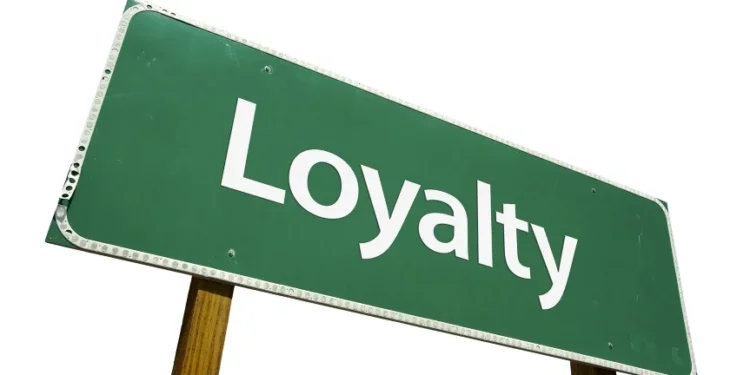“Where the battle rages, there the loyalty of the soldier is proved.”
-Martin Luther King Jnr.
“There’s no art to find the mind’s construction in the face.”
-William Shakespeare.
Loyalty is a virtue that has been revered and celebrated throughout history. It is a quality that speaks to the unwavering dedication and commitment one has towards a person, an institution, a cause, principle, or belief. The concept of loyalty is often associated with trust, reliability and fidelity.
Loyalty is most tested during trying moments, and can be seen in the steadfast support of a friend during such times, the unwavering dedication of a soldier to their country, the fierce allegiance of a fan to their favourite sports team, or the fastidiousness of a fanatic to a cause, be it religious, political or otherwise.
What exactly is the true colour of loyalty? Is it green, in the sense of green snake under the green grass? Or, is it black, like the black of the devil’s heart? Could it be the vibrant shade of red that symbolises passion and love, or the red of danger? Would it be the calming hue of blue, representing trust and stability, or that blue which conveys coldness? Perhaps it is white, the white of purity.
What of the texture? Is it of scalpel blades, sharp and deadly? Is it light and frail to the feel? Or could it be rough and uneven to the touch? Maybe it is smooth and calming to the souls of both the giver and recipient.
No matter the angle from which you view or feel loyalty, it is a virtue that great men and women hold close to their chest.
READ ALSO
Benue State Attorney General Visits Agate Radio
Group Raises Alarm Over Plans to Repeal Anti- Open Grazing Law
Traditionally, my people, the people of Orokam, place high premium on personal or individual loyalty which manifests in strong family ties, deep friendships, and a sense of communal responsibility. To them, loyalty is the steadfast commitment to stand by family, friends, organisations and ideals, through good and bad times. It is a core component of a virtuous character.
In the good old days when responsible men and women were identified by the consistency of their principles and commitment to upholding community values, a person whose loyalty to the family or community was doubtful automatically lost the trust and confidence of the people.
However, the pressures of today’s life which have birthed greed, individualism, deceit and betrayal, have equally eroded these traditional bonds. Loyalty as a virtue has suffered the most. Today, a lot of people’s sickening sense of entitlement has turned them into ingrates who do not appreciate, let alone show gratitude, for benefits brought their way through the painstaking sacrifice and goodwill of others.
Yes, in the rapidly evolving landscape of contemporary Nigeria, loyalty as a virtue has become an increasingly scarce commodity. Once considered a strong pillar in our society, loyalty appears to be under threat, going into extinction. Sadly, this worrisome trend has detrimental consequences for the fabric of our existence as a people.
This is why it is not uncommon these days to see siblings at odds, friends turning against each other, neighbours living in isolation as trust and loyalty become scarcer. In the work place, loyalty which used to be a strong ingredient for organisational growth and success has suffered a significant decline.
On the political scene, it is worse. There, loyalty fades faster than an Adire wrapper made with fake, non-resistant dye. This is why partisan harlotry enjoys strong visibility on our political landscape where ideological grounding is not likely to ever happen. The loyalty of politicians to their political parties, leaders, institutions, government and indeed nationhood, more often than not, is as fluid as quicksand. Most are loyal in the day and disloyal in the night. More than ever, the reality of Shakespeare’s quote above hits home with force.
The erosion of loyalty hinders cooperation, trust and socio-communal cohesion which are ordinarily vital ingredients for progress. It ultimately weakens the foundations of society because anyone bitten by the bug of disloyalty will most likely not be altruistic or willing to volunteer their time for the good of their communities and every other thing or person their loyalty should be directed at.
It also has consequences for the disloyal. It attracts reputational damage. Once someone is found to be disloyal, their reputation and credibility can be irretrievably tarnished, destroyed. This can lead to repercussions in their personal, professional or political life.
It can even get worse. If you are conversant with William Shakespeare’s Julius Caesar, you will recall that though Brutus and Cassius became disloyal and betrayed their friend Caesar, killing him. However, they didn’t end well either. They too were consumed eventually.
From what is happening in our everyday life, loyalty is a virtue that has become endangered. But we need to do all we can to keep it alive, given that loyalty is a key factor in building trust and reliability between individuals. It fosters strong and positive relationships, creating a sense of security, mutual respect and emotional connections. In the work place, loyalty among staff helps to create a cohesive and supportive environment, boosting morale, collaboration and productivity.
When you are loyal, there is no likelihood that you can betray a person, institution, belief or cause, no matter how intensely the battle rages. And as Martin Luther says above, the loyalty of a worthy soldier is proved better under difficult and challenging battles or situations.
A society where more citizens embrace genuine loyalty as a routine would experience deeper connections, greater resilience, and a heightened sense of shared purpose. In fact, in these uncertain times, rediscovering the value of this timeless virtue could be truly transformative.






